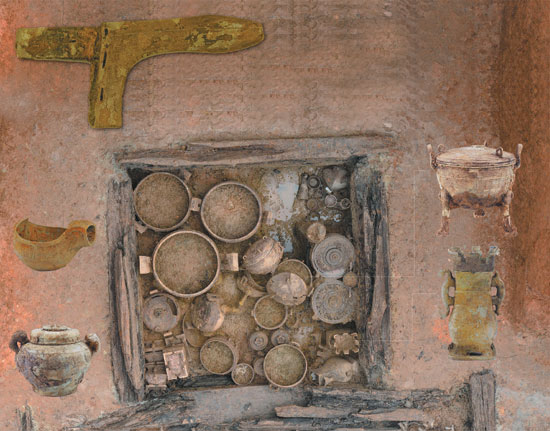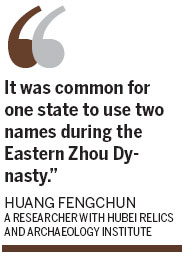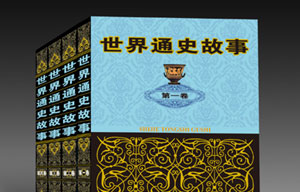
 'Taken 2' grabs movie box office crown
'Taken 2' grabs movie box office crown
 Rihanna's 'Diamonds' tops UK pop chart
Rihanna's 'Diamonds' tops UK pop chart
 Fans get look at vintage Rolling Stones
Fans get look at vintage Rolling Stones
 Celebrities attend Power of Women event
Celebrities attend Power of Women event
 Ang Lee breaks 'every rule' to make unlikely new Life of Pi film
Ang Lee breaks 'every rule' to make unlikely new Life of Pi film
 Rihanna almost thrown out of nightclub
Rihanna almost thrown out of nightclub
 'Dark Knight' wins weekend box office
'Dark Knight' wins weekend box office
 'Total Recall' stars gather in Beverly Hills
'Total Recall' stars gather in Beverly Hills
History unfolds
Updated: 2013-03-06 10:06
By Wang Ru (China Daily)
|
||||||||
 |
|
The "dagger offering to the Great Minister of War of Sui". |
The discovery of a 2,500-year-old dagger in Hubei province might prove that the states of Sui and Zeng were actually the same. Wang Ru shares his findings.
Huang Fengchun, a leading archaeologist in Hubei province, has been receiving congratulatory messages from fellow archaeologists ever since he unearthed a bronze dagger in January.
The treasure is 21 cm long and at least 2,500 years old, with a nine-character inscription on it, which literally means "dagger offering to the Great Minister of War of Sui". It is now wrapped and kept in the storeroom by his office that looks like an air-raid shelter, in the basement of Suizhou Museum.
"It was buried with the owner of the tomb, who might be the minister of defense of the State of Sui," explains Huang, who is also a researcher with Hubei Relics and Archaeology Institute.

Huang's team also excavated more than 1,000 pieces of historical relics, mostly bronze vessels and weapons from the Eastern Zhou Dynasty (770-256 BC) in Suizhou, a city in Hubei province.
Most relics have inscriptions reading "the State of Zeng", except the dagger.
Compared to the abundant relics unearthed in Suizhou, such as the chime bells unearthed from the 2,400-year-old tomb of Marquis Yi of Zeng State in 1978, the dagger looks quite ordinary.
But the character "Sui" on the dagger makes it priceless because this is the first time a relic had the character engraved on it. It represents the State of Sui, a vassal state of the Eastern Zhou Dynasty.
"It could be an important discovery to solve the puzzle of Sui and Zeng states, which historians have been debating for a long time," Huang says.
In 2009, when a bronze vessel was uncovered in a muddy construction site in Suizhou, the whole project stopped immediately.
Since June 2011, Huang and his fellow archaeologists from Hubei Relics and Archaeology Institute have discovered 68 earthen and brick tombs at the site.
- National Museum of China leads the way
- Nanjing University History Museum and Art and Archaeology Museum
- A museum of their own
- 'Harry Potter' wants to learn archaeology
- Tall tales tell kids all about history
- BBC broadcaster's Chinese history stories
- Museums reinvent themselves to better cater to the public
Most Viewed
Editor's Picks

|

|

|

|

|

|
Today's Top News
Boston bombing suspect reported cornered on boat
7.0-magnitude quake hits Sichuan
Cross-talk artist helps to spread the word
'Green' awareness levels drop in Beijing
Palace Museum spruces up
First couple on Time's list of most influential
H7N9 flu transmission studied
Trading channels 'need to broaden'
US Weekly

|

|









